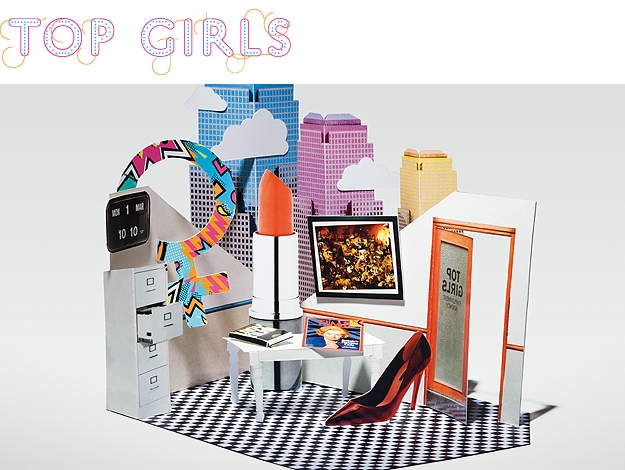interview: catherine fitzgerald, director of “top girls”
 The gender imbalance in Australian theatre has been a talking point over the past few years. In South Australia this imbalance, which sees men greatly outnumber women as playwrights, directors and artistic directors, was evident in the State Theatre Company of South Australia’s 2011 season, with all eight plays authored by men. It is not just my own state that has problems – the favouritism of men over women prompted the Australia Council for the Arts to commission the Women in Theatre report, published in April of this year.
The gender imbalance in Australian theatre has been a talking point over the past few years. In South Australia this imbalance, which sees men greatly outnumber women as playwrights, directors and artistic directors, was evident in the State Theatre Company of South Australia’s 2011 season, with all eight plays authored by men. It is not just my own state that has problems – the favouritism of men over women prompted the Australia Council for the Arts to commission the Women in Theatre report, published in April of this year.
On the back of this cry for equality comes the programming of Caryl Churchill’s 1982 Top Girls at two of Australia’s main stage theatre companies, with both Melbourne Theatre Company and State Theatre Company of SA producing the feminist play. I spoke with Catherine Fitzgerald, director of State Theatre’s production, about the relevance of the play today and the future of women in theatre.
Top Girls examines the role of women in Margaret Thatcher’s England, with main character Marlene representing the struggles thrust upon women by capitalism. Asked if the issues discussed in the play have changed, Fitzgerald’s answer is a firm ‘no’.
‘In terms of the backdrop in which it’s set, which is the backdrop of Maggie Thatcher’s England where she has been a right wing conservative, introduced voluntarism, wore down the welfare state and tried to smash the unions, and so the gap between the haves and the have-nots grew bigger. The whole argument about individual woman’s success versus her sisters – for want of a better description – I think things have actually gotten worse because they were the seeds of neo-liberalism being sown and it’s really come back to bite us on the bum because those policies have actually now been absorbed and adopted into Australian society, first by Keating and then Hawke and then absolutely embraced by Howard, and now ironically we have a female prime minister who is still a “small l” liberal neo-liberalist.
‘There have been changes that have been beneficial to women but I think what has happened is that women probably work three times as hard now.’
With feminism often considered a dirty word or an unnecessary concept, it can be assumed that the audience could struggle to accept and absorb the play’s messages. Fitzgerald believes that the audience is ready for the discussion of sexism regardless of those who deny its existence.
‘I think there is a lot of retro sexism, and anti-feminism is on the rise, but I think that makes it even more important to actually put it out there and discuss. Feminism has brought many social changes which have not only benefited women but benefited men as well and I don’t think that that’s often acknowledged. I think that people take those advances for granted, and I don’t think we should ever take anything for granted because it’s really easy to grind down and diminish social changes and even legislative changes – legislative changes are a bit harder but everything can still be ground down – but once you lose something you’ll never get it back, so I think it’s even more important to fight for equal opportunity for everyone.’
When it comes to the current debate over gender equality in Australian theatre, Fitzgerald asserts that the problem is more complex than the numbers game that it comes down to on paper.
‘It’s also whose stories are being told onstage, who is central to the narrative which I think we also need to look into. Who gets produced, and who doesn’t.
‘There’s huge amounts of fantastic women writers out there that don’t get produced and you have to ask why. A lot of them have won national awards and they still don’t get their work produced.’
It is not going to be easy to try and ameliorate the disparity that exists in the theatre. An increase in funding and a shift in thinking are required to try and affect change.
‘I think with the Women in Theatre report, one of the problems is not just the theatres that we’ve got, the problem is that funding has actually been taken out of the theatre sector and so there’s not diversity because there’s not the amount of companies to create that diversity to feed into the mainstream. In South Australia twenty years ago we had fourteen secondary companies and now we have two – how can that be creating diversity? It’s impossible. It needs an injection of funds and lateral thinking on how to improve the whole theatre sector.’
State Theatre Company’s run of Top Girls is on at the Dunstan Playhouse from August 17 to September 8. Tickets from $29 at Bass.
Melbourne Theatre Company’s run is at MTC’s Sumner Theatre from August 25 – September 29. Tickets from $33.

